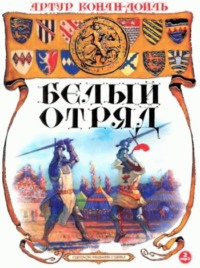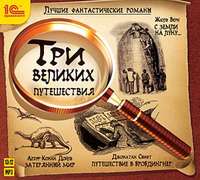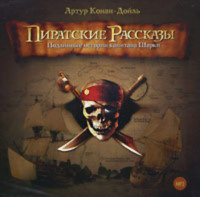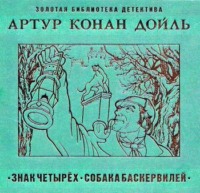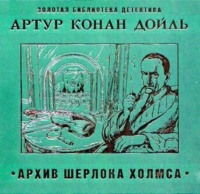 полная версия
полная версияRound the Fire Stories
“Now, there is one most remarkable and suggestive fact which has not met with the attention which it deserves. There is a local train running through Harrow and King’s Langley, which is timed in such a way that the express must have overtaken it at or about the period when it eased down its speed to eight miles an hour on account of the repairs of the line. The two trains would at that time be travelling in the same direction at a similar rate of speed and upon parallel lines. It is within everyone’s experience how, under such circumstances, the occupant of each carriage can see very plainly the passengers in the other carriages opposite to him. The lamps of the express had been lit at Willesden, so that each compartment was brightly illuminated, and most visible to an observer from outside.
“Now, the sequence of events as I reconstruct them would be after this fashion. This young man with the abnormal number of watches was alone in the carriage of the slow train. His ticket, with his papers and gloves and other things, was, we will suppose, on the seat beside him. He was probably an American, and also probably a man of weak intellect. The excessive wearing of jewellery is an early symptom in some forms of mania.
“As he sat watching the carriages of the express which were (on account of the state of the line) going at the same pace as himself, he suddenly saw some people in it whom he knew. We will suppose for the sake of our theory that these people were a woman whom he loved and a man whom he hated – and who in return hated him. The young man was excitable and impulsive. He opened the door of his carriage, stepped from the footboard of the local train to the footboard of the express, opened the other door, and made his way into the presence of these two people. The feat (on the supposition that the trains were going at the same pace) is by no means so perilous as it might appear.
“Having now got our young man without his ticket into the carriage in which the elder man and the young woman are travelling, it is not difficult to imagine that a violent scene ensued. It is possible that the pair were also Americans, which is the more probable as the man carried a weapon – an unusual thing in England. If our supposition of incipient mania is correct, the young man is likely to have assaulted the other. As the upshot of the quarrel the elder man shot the intruder, and then made his escape from the carriage, taking the young lady with him. We will suppose that all this happened very rapidly, and that the train was still going at so slow a pace that it was not difficult for them to leave it. A woman might leave a train going at eight miles an hour. As a matter of fact, we know that this woman did do so.
“And now we have to fit in the man in the smoking carriage. Presuming that we have, up to this point, reconstructed the tragedy correctly, we shall find nothing in this other man to cause us to reconsider our conclusions. According to my theory, this man saw the young fellow cross from one train to the other, saw him open the door, heard the pistol-shot, saw the two fugitives spring out on to the line, realized that murder had been done, and sprang out himself in pursuit. Why he has never been heard of since – whether he met his own death in the pursuit, or whether, as is more likely, he was made to realize that it was not a case for his interference – is a detail which we have at present no means of explaining. I acknowledge that there are some difficulties in the way. At first sight, it might seem improbable that at such a moment a murderer would burden himself in his flight with a brown leather bag. My answer is that he was well aware that if the bag were found his identity would be established. It was absolutely necessary for him to take it with him. My theory stands or falls upon one point, and I call upon the railway company to make strict inquiry as to whether a ticket was found unclaimed in the local train through Harrow and King’s Langley upon the 18th of March. If such a ticket were found my case is proved. If not, my theory may still be the correct one, for it is conceivable either that he travelled without a ticket or that his ticket was lost.”
To this elaborate and plausible hypothesis the answer of the police and of the company was, first, that no such ticket was found; secondly, that the slow train would never run parallel to the express; and, thirdly, that the local train had been stationary in King’s Langley Station when the express, going at fifty miles an hour, had flashed past it. So perished the only satisfying explanation, and five years have elapsed without supplying a new one. Now, at last, there comes a statement which covers all the facts, and which must be regarded as authentic. It took the shape of a letter dated from New York, and addressed to the same criminal investigator whose theory I have quoted. It is given here in extenso, with the exception of the two opening paragraphs, which are personal in their nature: – “You’ll excuse me if I’m not very free with names. There’s less reason now than there was five years ago when mother was still living. But for all that, I had rather cover up our tracks all I can. But I owe you an explanation, for if your idea of it was wrong, it was a mighty ingenious one all the same. I’ll have to go back a little so as you may understand all about it.“My people came from Bucks, England, and emigrated to the States in the early fifties. They settled in Rochester, in the State of New York, where my father ran a large dry goods store. There were only two sons: myself, James, and my brother, Edward. I was ten years older than my brother, and after my father died I sort of took the place of a father to him, as an elder brother would. He was a bright, spirited boy, and just one of the most beautiful creatures that ever lived. But there was always a soft spot in him, and it was like mould in cheese, for it spread and spread, and nothing that you could do would stop it. Mother saw it just as clearly as I did, but she went on spoiling him all the same, for he had such a way with him that you could refuse him nothing. I did all I could to hold him in, and he hated me for my pains.
“You’ll excuse me if I’m not very free with names. There’s less reason now than there was five years ago when mother was still living. But for all that, I had rather cover up our tracks all I can. But I owe you an explanation, for if your idea of it was wrong, it was a mighty ingenious one all the same. I’ll have to go back a little so as you may understand all about it.
“My people came from Bucks, England, and emigrated to the States in the early fifties. They settled in Rochester, in the State of New York, where my father ran a large dry goods store. There were only two sons: myself, James, and my brother, Edward. I was ten years older than my brother, and after my father died I sort of took the place of a father to him, as an elder brother would. He was a bright, spirited boy, and just one of the most beautiful creatures that ever lived. But there was always a soft spot in him, and it was like mould in cheese, for it spread and spread, and nothing that you could do would stop it. Mother saw it just as clearly as I did, but she went on spoiling him all the same, for he had such a way with him that you could refuse him nothing. I did all I could to hold him in, and he hated me for my pains.
“At last he fairly got his head, and nothing that we could do would stop him. He got off into New York, and went rapidly from bad to worse. At first he was only fast, and then he was criminal; and then, at the end of a year or two, he was one of the most notorious young crooks in the city. He had formed a friendship with Sparrow MacCoy, who was at the head of his profession as a bunco-steerer, green goods-man, and general rascal. They took to card-sharping, and frequented some of the best hotels in New York. My brother was an excellent actor (he might have made an honest name for himself if he had chosen), and he would take the parts of a young Englishman of title, of a simple lad from the West, or of a college undergraduate, whichever suited Sparrow MacCoy’s purpose. And then one day he dressed himself as a girl, and he carried it off so well, and made himself such a valuable decoy, that it was their favourite game afterwards. They had made it right with Tammany and with the police, so it seemed as if nothing could ever stop them, for those were in the days before the Lexow Commission, and if you only had a pull, you could do pretty nearly everything you wanted.
“And nothing would have stopped them if they had only stuck to cards and New York, but they must needs come up Rochester way, and forge a name upon a check. It was my brother that did it, though everyone knew that it was under the influence of Sparrow MacCoy. I bought up that check, and a pretty sum it cost me. Then I went to my brother, laid it before him on the table, and swore to him that I would prosecute if he did not clear out of the country. At first he simply laughed. I could not prosecute, he said, without breaking our mother’s heart, and he knew that I would not do that. I made him understand, however, that our mother’s heart was being broken in any case, and that I had set firm on the point that I would rather see him in a Rochester gaol than in a New York hotel. So at last he gave in, and he made me a solemn promise that he would see Sparrow MacCoy no more, that he would go to Europe, and that he would turn his hand to any honest trade that I helped him to get. I took him down right away to an old family friend, Joe Willson, who is an exporter of American watches and clocks, and I got him to give Edward an agency in London, with a small salary and a 15 per cent. commission on all business. His manner and appearance were so good that he won the old man over at once, and within a week he was sent off to London with a case full of samples.
“It seemed to me that this business of the check had really given my brother a fright, and that there was some chance of his settling down into an honest line of life. My mother had spoken with him, and what she said had touched him, for she had always been the best of mothers to him, and he had been the great sorrow of her life. But I knew that this man Sparrow MacCoy had a great influence over Edward, and my chance of keeping the lad straight lay in breaking the connection between them. I had a friend in the New York detective force, and through him I kept a watch upon MacCoy. When within a fortnight of my brother’s sailing I heard that MacCoy had taken a berth in the Etruria, I was as certain as if he had told me that he was going over to England for the purpose of coaxing Edward back again into the ways that he had left. In an instant I had resolved to go also, and to put my influence against MacCoy’s. I knew it was a losing fight, but I thought, and my mother thought, that it was my duty. We passed the last night together in prayer for my success, and she gave me her own Testament that my father had given her on the day of their marriage in the Old Country, so that I might always wear it next my heart.
“I was a fellow-traveller, on the steamship, with Sparrow MacCoy, and at least I had the satisfaction of spoiling his little game for the voyage. The very first night I went into the smoking-room, and found him at the head of a card table, with half-a-dozen young fellows who were carrying their full purses and their empty skulls over to Europe. He was settling down for his harvest, and a rich one it would have been. But I soon changed all that.
“‘Gentlemen,’ said I, ‘are you aware whom you are playing with?’
“‘What’s that to you? You mind your own business!’ said he, with an oath.
“‘Who is it, anyway?’ asked one of the dudes.
“‘He’s Sparrow MacCoy, the most notorious cardsharper in the States.’
“Up he jumped with a bottle in his hand, but he remembered that he was under the flag of the effete Old Country, where law and order run, and Tammany has no pull. Gaol and the gallows wait for violence and murder, and there’s no slipping out by the back door on board an ocean liner.
“‘Prove your words, you – !’ said he.
“‘I will!’ said I. ‘If you will turn up your right shirt-sleeve to the shoulder, I will either prove my words or I will eat them.’
“He turned white and said not a word. You see, I knew something of his ways, and I was aware that part of the mechanism which he and all such sharpers use consists of an elastic down the arm with a clip just above the wrist. It is by means of this clip that they withdraw from their hands the cards which they do not want, while they substitute other cards from another hiding-place. I reckoned on it being there, and it was. He cursed me, slunk out of the saloon, and was hardly seen again during the voyage. For once, at any rate, I got level with Mister Sparrow MacCoy.
“But he soon had his revenge upon me, for when it came to influencing my brother he outweighed me every time. Edward had kept himself straight in London for the first few weeks, and had done some business with his American watches, until this villain came across his path once more. I did my best, but the best was little enough. The next thing I heard there had been a scandal at one of the Northumberland Avenue hotels: a traveller had been fleeced of a large sum by two confederate card-sharpers, and the matter was in the hands of Scotland Yard. The first I learned of it was in the evening paper, and I was at once certain that my brother and MacCoy were back at their old games. I hurried at once to Edward’s lodgings. They told me that he and a tall gentleman (whom I recognized as MacCoy) had gone off together, and that he had left the lodgings and taken his things with him. The landlady had heard them give several directions to the cabman, ending with Euston Station, and she had accidentally overheard the tall gentleman saying something about Manchester. She believed that that was their destination.
“A glance at the time-table showed me that the most likely train was at five, though there was another at 4.35 which they might have caught. I had only time to get the later one, but found no sign of them either at the depôt or in the train. They must have gone on by the earlier one, so I determined to follow them to Manchester and search for them in the hotels there. One last appeal to my brother by all that he owed to my mother might even now be the salvation of him. My nerves were overstrung, and I lit a cigar to steady them. At that moment, just as the train was moving off, the door of my compartment was flung open, and there were MacCoy and my brother on the platform.
“They were both disguised, and with good reason, for they knew that the London police were after them. MacCoy had a great Astrakhan collar drawn up, so that only his eyes and nose were showing. My brother was dressed like a woman, with a black veil half down his face, but of course it did not deceive me for an instant, nor would it have done so even if I had not known that he had often used such a dress before. I started up, and as I did so MacCoy recognized me. He said something, the conductor slammed the door, and they were shown into the next compartment. I tried to stop the train so as to follow them, but the wheels were already moving, and it was too late.
“When we stopped at Willesden, I instantly changed my carriage. It appears that I was not seen to do so, which is not surprising, as the station was crowded with people. MacCoy, of course, was expecting me, and he had spent the time between Euston and Willesden in saying all he could to harden my brother’s heart and set him against me. That is what I fancy, for I had never found him so impossible to soften or to move. I tried this way and I tried that; I pictured his future in an English gaol; I described the sorrow of his mother when I came back with the news; I said everything to touch his heart, but all to no purpose. He sat there with a fixed sneer upon his handsome face, while every now and then Sparrow MacCoy would throw in a taunt at me, or some word of encouragement to hold my brother to his resolutions.
“‘Why don’t you run a Sunday-school?’ he would say to me, and then, in the same breath: ‘He thinks you have no will of your own. He thinks you are just the baby brother and that he can lead you where he likes. He’s only just finding out that you are a man as well as he.’
“It was those words of his which set me talking bitterly. We had left Willesden, you understand, for all this took some time. My temper got the better of me, and for the first time in my life I let my brother see the rough side of me. Perhaps it would have been better had I done so earlier and more often.
“‘A man!’ said I. ‘Well, I’m glad to have your friend’s assurance of it, for no one would suspect it to see you like a boarding-school missy. I don’t suppose in all this country there is a more contemptible-looking creature than you are as you sit there with that Dolly pinafore upon you.’ He coloured up at that, for he was a vain man, and he winced from ridicule.
“‘It’s only a dust-cloak,’ said he, and he slipped it off. ‘One has to throw the coppers off one’s scent, and I had no other way to do it.’ He took his toque off with the veil attached, and he put both it and the cloak into his brown bag. ‘Anyway, I don’t need to wear it until the conductor comes round,’ said he.
“‘Nor then, either,’ said I, and taking the bag I slung it with all my force out of the window. ‘Now,’ said I, ‘you’ll never make a Mary Jane of yourself while I can help it. If nothing but that disguise stands between you and a gaol, then to gaol you shall go.’
“That was the way to manage him. I felt my advantage at once. His supple nature was one which yielded to roughness far more readily than to entreaty. He flushed with shame, and his eyes filled with tears. But MacCoy saw my advantage also, and was determined that I should not pursue it.
“‘He’s my pard, and you shall not bully him,’ he cried.
“‘He’s my brother, and you shall not ruin him,’ said I. ‘I believe a spell of prison is the very best way of keeping you apart, and you shall have it, or it will be no fault of mine.’
“‘Oh, you would squeal, would you?’ he cried, and in an instant he whipped out his revolver. I sprang for his hand, but saw that I was too late, and jumped aside. At the same instant he fired, and the bullet which would have struck me passed through the heart of my unfortunate brother.
“He dropped without a groan upon the floor of the compartment, and MacCoy and I, equally horrified, knelt at each side of him, trying to bring back some signs of life. MacCoy still held the loaded revolver in his hand, but his anger against me and my resentment towards him had both for the moment been swallowed up in this sudden tragedy. It was he who first realized the situation. The train was for some reason going very slowly at the moment, and he saw his opportunity for escape. In an instant he had the door open, but I was as quick as he, and jumping upon him the two of us fell off the footboard and rolled in each other’s arms down a steep embankment. At the bottom I struck my head against a stone, and I remembered nothing more. When I came to myself I was lying among some low bushes, not far from the railroad track, and somebody was bathing my head with a wet handkerchief. It was Sparrow MacCoy.
“‘I guess I couldn’t leave you,’ said he. ‘I didn’t want to have the blood of two of you on my hands in one day. You loved your brother, I’ve no doubt; but you didn’t love him a cent more than I loved him, though you’ll say that I took a queer way to show it. Anyhow, it seems a mighty empty world now that he is gone, and I don’t care a continental whether you give me over to the hangman or not.’
“He had turned his ankle in the fall, and there we sat, he with his useless foot, and I with my throbbing head, and we talked and talked until gradually my bitterness began to soften and to turn into something like sympathy. What was the use of revenging his death upon a man who was as much stricken by that death as I was? And then, as my wits gradually returned, I began to realize also that I could do nothing against MacCoy which would not recoil upon my mother and myself. How could we convict him without a full account of my brother’s career being made public – the very thing which of all others we wished to avoid? It was really as much our interest as his to cover the matter up, and from being an avenger of crime I found myself changed to a conspirator against Justice. The place in which we found ourselves was one of those pheasant preserves which are so common in the Old Country, and as we groped our way through it I found myself consulting the slayer of my brother as to how far it would be possible to hush it up.
“I soon realized from what he said that unless there were some papers of which we knew nothing in my brother’s pockets, there was really no possible means by which the police could identify him or learn how he had got there. His ticket was in MacCoy’s pocket, and so was the ticket for some baggage which they had left at the depôt. Like most Americans, he had found it cheaper and easier to buy an outfit in London than to bring one from New York, so that all his linen and clothes were new and unmarked. The bag, containing the dust cloak, which I had thrown out of the window, may have fallen among some bramble patch where it is still concealed, or may have been carried off by some tramp, or may have come into the possession of the police, who kept the incident to themselves. Anyhow, I have seen nothing about it in the London papers. As to the watches, they were a selection from those which had been intrusted to him for business purposes. It may have been for the same business purposes that he was taking them to Manchester, but – well, it’s too late to enter into that.
“I don’t blame the police for being at fault. I don’t see how it could have been otherwise. There was just one little clew that they might have followed up, but it was a small one. I mean that small circular mirror which was found in my brother’s pocket. It isn’t a very common thing for a young man to carry about with him, is it? But a gambler might have told you what such a mirror may mean to a cardsharper. If you sit back a little from the table, and lay the mirror, face upwards, upon your lap, you can see, as you deal, every card that you give to your adversary. It is not hard to say whether you see a man or raise him when you know his cards as well as your own. It was as much a part of a sharper’s outfit as the elastic clip upon Sparrow MacCoy’s arm. Taking that, in connection with the recent frauds at the hotels, the police might have got hold of one end of the string.
“I don’t think there is much more for me to explain. We got to a village called Amersham that night in the character of two gentlemen upon a walking tour, and afterwards we made our way quietly to London, whence MacCoy went on to Cairo and I returned to New York. My mother died six months afterwards, and I am glad to say that to the day of her death she never knew what happened. She was always under the delusion that Edward was earning an honest living in London, and I never had the heart to tell her the truth. He never wrote; but, then, he never did write at any time, so that made no difference. His name was the last upon her lips.
“There’s just one other thing that I have to ask you, sir, and I should take it as a kind return for all this explanation, if you could do it for me. You remember that Testament that was picked up. I always carried it in my inside pocket, and it must have come out in my fall. I value it very highly, for it was the family book with my birth and my brother’s marked by my father in the beginning of it. I wish you would apply at the proper place and have it sent to me. It can be of no possible value to any one else. If you address it to X, Bassano’s Library, Broadway, New York, it is sure to come to hand.”
THE POT OF CAVIARE
It was the fourth day of the siege. Ammunition and provisions were both nearing an end. When the Boxer insurrection had suddenly flamed up, and roared, like a fire in dry grass, across Northern China, the few scattered Europeans in the outlying provinces had huddled together at the nearest defensible post and had held on for dear life until rescue came – or until it did not. In the latter case, the less said about their fate the better. In the former, they came back into the world of men with that upon their faces which told that they had looked very closely upon such an end as would ever haunt their dreams.


